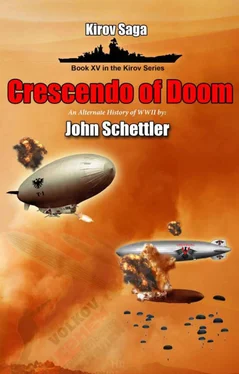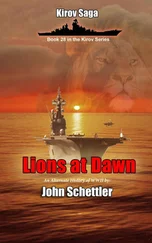Fedorov listened, the lines of his brow seeming to deepen as he did so. Signals? Warnings? What was all this about? “These signals,” he said, “did you ever determine their source?”
“Not exactly, though we speculated long and hard about that. You see, the information we were receiving was, in itself, plain evidence that told us where they were coming from, yet that said nothing of who may have sent them.”
“Then you know the location? You were able to triangulate the coordinates?” Fedorov was eager to get at the nub of this mystery.
“Not exactly… I am not speaking of a spatial location, not a place we might find by longitude and latitude. To find these coordinates we would have to navigate another way—through time. These signals came from the future—our future. They were originating from years beyond our own day; perhaps even beyond the 21st Century! They related information on events that had not even happened yet, but then, four days after each message, these events played out exactly as they were described to us.”
There came a soft knock on the door, though to Fedorov it was as though someone had pounded on the gates of his soul. His mind reeled with the realization of what this woman was telling him.
Tovey frowned when he heard the knock. He had given instructions that they were not to be disturbed unless… Now the interruption was more than a mere annoyance, it was another warning. He turned, eyeing the door, and then got up to open it. An officer was there with something in hand, and whispering softly to Tovey. When the man had finished, Tovey shut the door and turned to them again, holding out what looked to be a signals transcript.
“Ladies and gentlemen,” he said quietly. “It may be nothing more than a little coincidence, but we’ve just got a signal ourselves, though it originates from the here and now. The Admiralty informs me that Force H has a battle on its hands, with the Germans — no further details.”
Details… The devil lived there, or so it has been said. They were going to be most inconvenient for the men standing a watch with Force H that day.
The German task force had moved rapidly west, and it was only another strange coincidence that caused them a brief delay at Gibraltar. That port had proved to be a godsend for German U-boat Captains, and there were now six boats stationed there. Being much farther from England, it was relatively safe from RAF bombing raids, which would either have a long overseas journey, or a more dangerous flight path over hostile territory in France and Spain. So many U-boats that had formerly been berthed at Saint Nazaire or Brest moved to Gibraltar, where they prowled the straits, and also sortied out into both the Med and Atlantic.
Another ship was berthed there the night Lütjens arrived, the UJ-2210. It was an old French trawler, the Marcella , captured and converted into an undersea boat hunting ship, or U-Jaeger, and it was now in the proud possession of the man who would become Germany’s top hunter killer in that role, Captain Otto Pollmann. He had been out hunting that day, and had just completed refueling when the big flotilla came in. The sight of Germany’s largest and most powerful warship was a thrill, and he also took great interest in the sleek lines of the light carrier Goeben . Unfortunately his crew took equal interest, and when they had to move their trawler during the refueling operation for Bismarck , the hose became strained when the helmsman was gawking at the Hindenburg and failed to mind his station properly.
The trawler ran afoul of the hose, causing a fuel spillage and other damage to the fittings. It was going to cause a two hour delay in getting fuel into Bismarck , and those hours were used well by the British ships in Somerville’s Force H, as they now raced due north, intending to get into a good position to find Hindenburg if it sortied from Gibraltar. Those two hours were crucial, for if Lütjens had completed the refueling operation and left before dawn, as Adler promised, then the chances of intercepting the German fleet would have been very thin. As it stood now, things were quite different, but Force H was going to pay a price for its alacrity, as the German fleet was now a very dangerous enemy.
It was well after dawn before Lütjens was able to depart from Gibraltar, and at 14:00 he found himself off Cape Saint Vincent, Portugal, as planned, though they were well over the horizon to make certain curious eyes would not spot them. But not all curious eyes were landward that day. The Germans were soon to be visited by a pair of Fulmars off HMS Glorious , and Marco Ritter on the Goeben was to have a very busy morning.
It would be the second time that pilots off two opposing aircraft carriers had met in battle. Ritter was up in his ME-109T, and saw the two fulmars in a tight formation, some distance below. It was a perfect scenario for an ambush, and he quickly tipped over his wings and dove to attack. The resulting fight saw him down one Fulmar, which put up just enough of a fight to allow the second to escape. Ritter saw the other plane speeding away, and thought he might open his throttle to see if he could catch it. But he had been up too long that day, and low fuel compelled him to return to the Goeben . Yet he took careful note of the direction the enemy plane was flying, and reported it to the ship’s Captain as soon as he was aboard.
“Hans!” he said when he was again below decks to check on his plane. There was one small hole in the tail where the enemy had nicked him.
“Getting sloppy?” asked Hans Rudel.
“Oh that? It was nothing. Just a lucky shot. I was up and around on him in no time, and put him in the sea. The other fellow was smart enough to make a run for it. But now it’s your turn, Hans. Let’s get back up there and look for this enemy carrier!”
And they did.
Hafner, Brendel, and Rudel were in the only three Stukas aboard the Flugdeckkreuzer . Heilich, Ehrler and Ritter were flying escort in ME-109-T fighters. The remaining six planes were all ME-109s, and they would be retained for combat air patrol over Lütjens task force. Marco Ritter followed his nose, and it was not long before the six planes found what they were looking for. There was only one thing that gnawed at him when he finally spotted the enemy task force below—those damnable rockets. So far they had not seen their evil white tails in the sky, and now it was time to get those Stukas in for an attack run before they came.
“There they are, Hans! I’ll keep those fighters off your backside. Good hunting!”
* * *
AboardHMS Glorious the alarm sounded at 15:20 hours, not long after Lieutenant Charles Stewart came in with a badly nicked Fulmar. His mate, Eddie Shackley, was not coming home that day, and the word was soon passed to the bridge where Captain Christopher Wells now commanded the only capital ship remaining in Force H. Admiral Somerville was ashore, still on the Canary Islands coordinating an operation being teed up by the Royal Marine Commandos. So instead of planting his flag on HMS Glorious , Somerville was content to command from his desk in the Grand Canary Harbor HQ facility.
“Mister Lovell,” said Wells to his XO after he got the report. “See that Admiral Somerville is informed of this incident, and make certain he knows that Stewart thinks these were 109-T Messerschmitts. He says he could clearly see the arrestor hooks.”
“That would mean that new German carrier is about.”
“Indeed, and we both know what that means. That ship was operating as a forward screen for Hindenburg and Bismarck .”
Читать дальше












